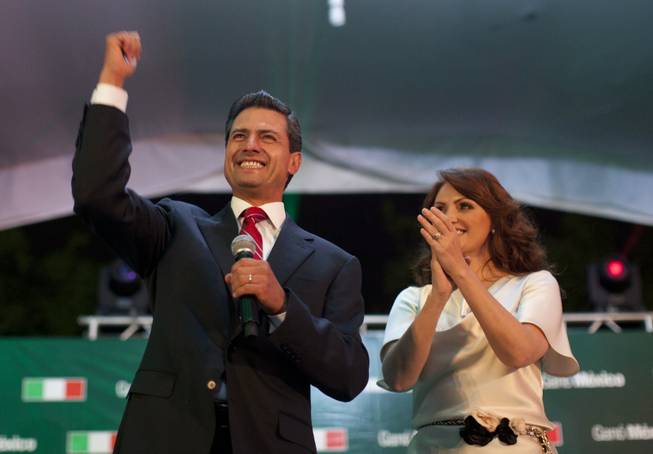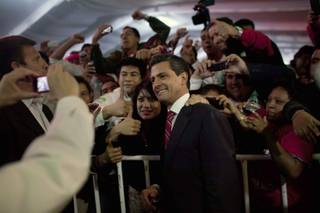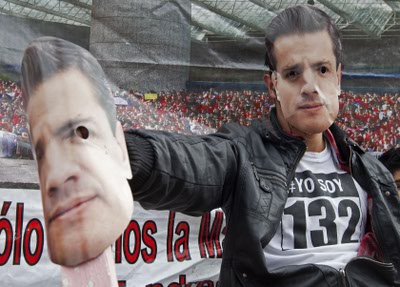
Alexandre Meneghini / AP
Enrique Peña Nieto, presidential candidate for the Revolutionary Institutional Party, left, speaks to supporters accompanied by his wife, Angelica Rivera, at the party’s headquarters in Mexico City, July 2, 2012.
Tuesday, July 3, 2012 | 2 a.m.
Recent Supreme Court action
With two highly anticipated Supreme Court decisions released last week and a domestic presidential race growing more contentious as the calendar ticks toward November, the U.S. public could be forgiven if it failed to realize that Mexicans went to the polls Sunday to choose their next president.
Enrique Peña Nieto, the current governor of Mexico State, won with approximately 38 percent of the vote, reclaiming the presidency for the Institutional Revolutionary Party (known as PRI, for its Mexican acronym), which ruled Mexico for 71 years before the National Action Party (PAN) won in both 2000 and 2006.
While U.S. observers of Mexican politics said drastic changes in policy were unlikely, how Peña Nieto tackles his six-year term can affect the future course of the drug war, the health of Mexico’s economy and, as a result, immigration from south of the Rio Grande.
As is the case in the United States, the top issue for Mexican voters was the economy.
“The (Mexican) economy has just not grown at a fast rate,” UNLV political scientist John Tuman said Monday. “The last couple of years growth increased, but the average growth rate has been low under (outgoing President Felipe) Calderon. Real wages have stagnated, meaning that, when adjusted for inflation, wages have stagnated. ... Under-employment is a problem, and there are a lot of workers who end up in the informal sector for which there are no official employment statistics. That employment is precarious. While data suggests that migration from Mexico to the U.S. has slowed, or even more are returning than coming, I tend to think that was not so much to do with the bright and improving employment picture in Mexico and more to do with contraction in the U.S.”
About 76 million people, 63 percent of the electorate, voted — a healthy turnout, analysts said. While Mexican citizens living outside the country are eligible to vote in national elections, few do. In all, Mexican election officials received about 45,000 ballots from outside the country. According to the Mexican Consulate in Las Vegas, about 1,200 people from the Silver State voted in Mexico’s presidential race this year.
However, that does not mean that many Mexicans who now call Las Vegas home did not closely follow the race.
Gabriela Baca, whose family comes from Chihuahua, gathered Sunday around the television in her Las Vegas home with friends and family and watched five straight hours of election coverage. She said her relatives in the northern part of Mexico tended to be supporters of the PAN, whose candidate, Josefina Vazquez Mota, would have been the first female president of Mexico had she won. Many voters were reluctant to cast a ballot for the PRI because the party was known for promoting a political patronage system and endemic corruption.
The victory for Peña Nieto, therefore, is seen as a testament to the party’s message that it will not return to its old ways and the confidence of the Mexican people in electoral reforms taken in the past quarter of a century.
“I think there are a lot more safeguards in place than 20 years ago,” Baca said. “The IFE (Mexico’s Federal Electoral Institute) is a lot stronger. I think new transparency laws will make it harder for the PRI to return to the corrupt cronyism of 20 years ago. I think Mexican society is more mobilized, and it is more prepared to hold government accountable at all levels.”
There are three major parties in Mexico, with each winning at least a quarter of the vote. The left-leaning Revolutionary Democratic Party (PRD) won nearly 32 percent of the vote and, after a poor mid-term showing in 2009, reasserted its ability to mobilize and win elections in areas where the party had previously been unsuccessful.
“The country has changed dramatically in the last 20 years,” said Chris Wilson, an analyst at the Mexico Institute at the Wilson Center in Washington, D.C. “A lot of checks and balances are in place now that didn’t exist when the PRI had an era of single-party rule. Congress is independent, the PRI doesn’t have a simple majority, and the governors have gained a great deal of independence.”
Without a doubt, violence from the ongoing drug war, which has left 50,000 dead in six years, also was a top concern for Mexican voters.
“Historically, Mexicans have had the sense that the PRI was not necessarily complicit in the drug war but that they established an equilibrium where they agreed to tolerate drug trafficking in exchange for drug traffickers keeping the violence and trafficking relatively hidden,” Wilson said.
Peña Nieto insisted that he would continue to fight against the drug cartels, but he also vowed to concentrate federal efforts on the violence that takes the greatest toll on the public.
“He is moving toward a more public security-based approach,” Wilson said of Peña Nieto. “To rein in the violence, they are focusing on the most violent crimes: extortion, kidnapping and homicide. To me it makes sense. No matter what type of security force you are talking about, police or military, it will have a limited capacity. They can’t go after all crimes, everywhere, all the time, equally. You have to prioritize.”
Peña Nieto is expected to continue down a similar economic path as his predecessors, promoting free-trade; solid relations with the United States, its chief trading partner; and expansion of the free market. Other reforms, such as changes to labor law or to allow for greater private investment in national oil company PEMEX — both of which Peña Nieto has suggested — would require the backing of the divided Congress.
During the PAN’s reign, the PRI frequently blocked its rivals’ initiatives in Congress, and if Peña Nieto and the PRI want to accomplish any significant reforms, they will need to work closely with the other parties. During the race, a student protest group emerged, Yo Soy 132, that staged multiple rallies, mostly targeting Peña Nieto and the PRI. Many of its demands focused on greater competition in industries that have been dominated by one or two companies, such as media or telecommunications. Those are reforms the majority of Mexicans support.
It all could lead to a dynamic not unfamiliar to anyone who has watched the escalating war of words and competing policies between the GOP and Democrats in the U.S. Congress.
“That’s what we’ll have to wait to see, whether or not there will be any cooperation,” Wilson said. “Let’s say the PRI wants energy reform, I could see the PAN saying, ‘Well, you blocked us before, so we won’t support you for nothing.’ They will see themselves as an opposition party and will extract something in return. ... If people feel the old authoritarianism of the PRI is returning, they will be back in the streets and the energy will be there to fight back.”
If Peña Nieto can curtail the drug-related violence in Mexico and the economy starts to grow, it could open up greater flexibility for immigration reform in the United States. Tuman suggested the PRI would be more aggressive in promoting a new guest worker program, but the sensitivity of the issue in the United States, most agree, would mean that the U.S. administration would have to lead the way.
“In the U.S., we consider people who enter the United States to be our issue; it’s a domestic political issue first and foremost,” Wilson said. “Any major initiative on immigration would have to start in the U.S. and then maybe Mexico could play a role. Mexico would certainly be more willing to support the U.S. in blocking illegal immigration if there were a reform of legal immigration.”



Join the Discussion:
Check this out for a full explanation of our conversion to the LiveFyre commenting system and instructions on how to sign up for an account.
Full comments policy